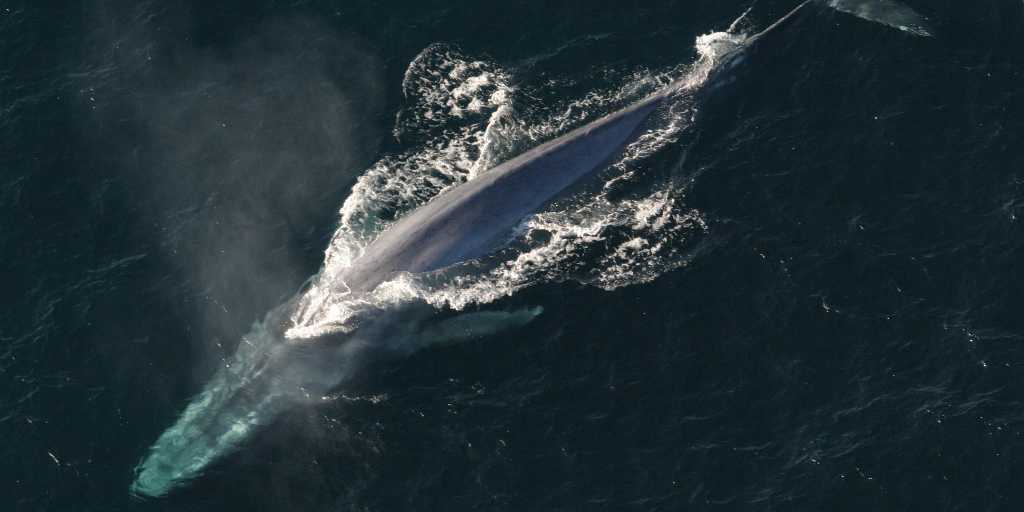This ancient whale might be the largest animal ever to live on Earth
Lesson summary
Hi there everyone, I’m Jeff and this is Plain English, where we help you upgrade your English skills with stories about current events and trending topics. By listening here, you’ll improve your vocabulary and upgrade your skills in English.
These lessons don’t produce themselves—and that’s why we have JR. He’s been the producer since day one here at Plain English. And he has uploaded the transcript of today’s episode to PlainEnglish.com/616.
Coming up today: the blue whale is the largest animal, the largest living creature on Earth. Scientists also think the blue whale is the largest animal ever to live in all of Earth’s history, including the dinosaur age. But a new discovery off the coast of Peru might challenge that assumption.
It shouldn’t come as a surprise that in the second half of the lesson, we talk about an English expression. And today, that expression is “come as a surprise.” I’ll show you three ways to use this very common expression. We have a quote of the week, too. And the fun continues online with videos, exercises, flashcards, quizzes and more at PlainEnglish.com/616.
I think we’re ready to start. Let’s get going.
Newly-discovered whale may be largest animal ever to live
The largest animal alive is the blue whale. The biggest blue whales are almost 30 meters long and they weigh almost 200 tons. That’s the equivalent of 2,500 people. The blue whale’s heart alone weighs 180 kilograms.
The blue whale is bigger than its ancestors. The smallest whales today are the size of average whales many millions of years ago. Large whales first appeared about 35 million years ago, but, scientists think, they started to get really big only about four million years ago. Evolution is slow, remember. But it appears that whales have been getting bigger with time.
So it came as a surprise when a team of paleontologists discovered a skeleton of a whale that might have been bigger than the blue whale—and which lived 39 million years ago.
A paleontologist is a scientist that studies fossils and the history of life on earth. And an international team of paleontologists discovered seventeen bones in the Ica Valley of southern Peru. At first , they didn’t know what they were looking at: the bones just looked like boulders. But additional testing revealed that they were, in fact, fossils. In total , they found a hip bone, four ribs, and thirteen vertebrae—those are the bones that make up an animal’s back.
These bones belong to a species of whale that had never been seen before. In fact , this skeleton is bigger than that of any other known species—whale or otherwise. Testing on the fossils dates the remains to 37 to 39 million years ago.
Only a small portion of the whale’s full skeleton was found, so the team had to estimate the size of the full animal. They looked at the size and density of the fossils and compared them to skeletons of other whales. From that, they estimate that this new species—they called it Perucitus colossus—they estimate that Perucitus colossus weighed between 93 and 340 tons.
The high end of that range is much bigger than today’s blue whales. But even the midpoint of that potential range would make this new whale bigger than blue whales today—and, therefore, the biggest animal ever to have lived on earth.
But even the low end of the range—93 tons—would make this new whale a giant for its time. And it complicates the story of how whales evolved.
Scientists think that today’s giant whales got so big when they developed filter feeding systems—the ability to ingest large quantities of small fish like krill and plankton just by moving through the water.
This new whale, however, somehow got to be very large before filter feeding systems evolved. So how did the newly-discovered Perucitus colossus eat enough to get so big? That’s a huge unanswered question . Unfortunately, the researchers didn’t discover a skull, which would give clues about the whale’s diet.
There are a few early hypotheses. The Perucitus colossus would not have been an agile swimmer, given its size and shape, so it would probably not have been a hunter of large fish. Whales don’t eat plants. And the filter feeding system had not yet evolved.
So that means it might have been a bottom-feeder. Another theory is that it might have been a scavenger, eating the carcasses of other fish and animals. But without a skull, it’s too early to tell.
The fossils are currently on display at the Natural History Museum in Lima.
The species was described in the scientific journal “Nature” in August of this year, 2023. I’m always in awe of how long the teams of scientists study fossils and evidence before their findings are released.
They discovered these fossils thirteen years ago. It took many years to get these fossils out of the rocks where they were found. And then they modeled them, studied them, and described their findings in that paper.
And in case you’re wondering—yes, these are bigger than the dinosaurs. The biggest dinosaur was 70 tons. This guy, this new whale, was at least 93 tons, the authors say.
Quote of the Week
Now it’s time for a quote of the week. Have you ever heard someone say they would die for their beliefs? Here’s an alternate take, from Bertrand Russell. He says, “I would never die for my beliefs because they might be wrong.”
Bertrand Russell was a mathematician and a philosopher. He says, “I would never die for my beliefs because they might be wrong.”
Learn English the way it’s really spoken

